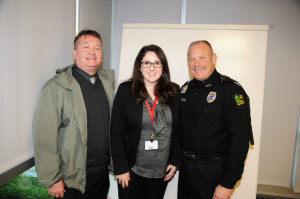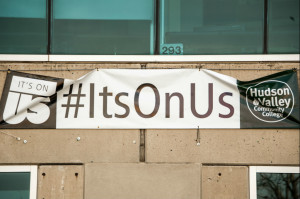Stopping Rape


- National campaign against sexual assault comes to HVCC
Kaylyn Hohn
Staff Writer
One in five women experience sexual assault during their college years, a statistic that got Hudson Valley Community College students talking on Nov. 3 in the Siek Campus Center.
A total of fourteen students attended “It’s On Us”, a conversation about the need to raise public awareness for sexual assault on college campuses and beyond.
“We’re pleased [sexual assault] is just starting to come to the public’s attention. The talk you’ve been hearing lately is what we’ve been hearing for years,” said Fred Aliberti, director of Public Safety.
The “It’s On Us” campaign, launched by the White House in September, is part of a nationwide movement. It asks “men and women to make a personal commitment to step off the sidelines and be a part of the solution to campus sexual assault.”
“To have the White House say ‘listen, we know that this happens and we’re not going to throw it under the rug anymore, we want to confront this’ … it’s opening up this dialogue that for some years I don’t really think has been happening,” said Lindsey Crusen of the Rensselaer County Sexual Assault Response Team (SART).
Almost 200 colleges and universities across the United States are committed to the campaign. Other organizations such as the NCAA and Viacom have partnered in the campaign thus far.
“This has been an issue for many, many years and it’s getting a lot of focus right now, so it’s a really good opportunity for us to have that dialogue and to figure out what we’re all going to do together as a community to stop this stuff from happening,” explained Crusen.
“We recognize that these crimes are extremely personal and extremely difficult to cope with so our main objective is to provide a really safe, secure location for someone to come and deal with,” said Crusen.
Crusen discussed how her program corresponds with Hudson Valley, and the options available for students who have been sexually assaulted. She offers counseling and support groups as a part of SART.
She stressed that the services offered to students are free, confidential and open to everyone.
The SART director also took time to explain Title IX, first established in 1972, has expanded to prohibiting sexual harassment and sexual violence on college campuses.
“There would be an investigation on campus. The victim would also have the opportunity, if they wanted, to make a report to outside law enforcement.They could report that they were sexually assaulted, so they can have two, dual investigations happening at once,” said Crusen.
Students got a chance to speak out against sexual violence during the discussion. To students such as Bintou Cissé, it is important that victims of all demographics can speak out.
“We should at least try to protect the children because they come in this world and they get used to this kind of mentality: ‘don’t tell’ and I think we all need to put everything together and stop that behavior,” she said.
Cissé continued, “It’s like if you feel like you have been assaulted in any kind of way you should be allowed to speak up and not be ashamed of it.”
Amanda Coughlin, a criminal justice major, also wants to see victims treated with dignity. “I think it would be beneficial to teach people how to deal with if their friend was sexually assaulted because I think people do just automatically jump to victim-blaming and I think certain people would be afraid to tell their friends,” she said.
Students were encouraged to fill out cards explaining why they have chosen to stand against sexual assault. The Hudson Valley Athletics Department has even taken to social media, pledging to stand up against sexual assault using the hashtag #ItsOnUs.
This is only the start of raising public awareness for sexual assault on college campuses. The message is that students can learn from this campaign and continue to spread their support, garnering support from other students in the process.
Crusen understands it will take time, but remains optimistic. “I would love it if I woke up tomorrow morning and there was no reason for me to have my job. It would be awesome. We all know we’re far away from that right now, but that’s our goal,” she said.
- SUNY and colleges across the country respond to deficient sexual assault policies
Tyler McNeil
Creative Editor
Rape and other sexual offenses on campuses across the country have recently been in the spotlight and colleges have come under fire for failing to effectively address the problem.
New York State is attempting to improve the situation. On Oct. 2, Gov. Cuomo directed SUNY to make affirmative consent, also known as, “yes means yes,” mandatory across campuses statewide. The order is set to be put into effect across 64 SUNY campuses.
California became to first state to pass affirmative consent legislation on Sept. 29.
Cuomo’s proposal includes a Sexual Assault Victims’ Bill of Rights giving victims rights to report complaints of sexual assault to police or campus security and identify other violations such as underage drinking in the report. His proposal will also issue a training program for college officials on handling and preventing assault and an family education campaign.
In a survey the Campus Accountability Project conducted in 2009, about 80 percent of colleges received a C grade based on their sexual assault policies. Only one in five colleges had amnesty clauses to protect victims of rape in the event of drug or alcohol induced non consensual activity.
Nearly 32.6 percent of 299 four-year institutions from 2009 to 2012 were seen to not entirely comply with the Clery Act, which mandates all colleges participating in federal financial aid programs must disclose all campus crimes or face penalties. The survey found that 13.5 percent of campus policies do not assist survivors with provisional relief guidance such as circumstantial changes at home and at school.
Colleges nationwide have raised their sleeves to reveal the scars of sexual assault. Across two major universities, 19 percent of female students experienced sexual assault during college according to a 2007 Campus Sexual Assault Study by the U.S. Department of Justice.
During the 2013-14 academic year, 238 complaints of sexual assault were made at at four year SUNY colleges.
In 2012, about 5,000 forcible sex offenses on college campuses were reported nationwide, 365 of them in New York State.
UAlbany Police officials have reported a total of 36 sexual offenses from 2011 to 2013.
Although a reported rape or sexual offense has not been reported at Hudson Valley in recent years, sexual violence has touched the college. In a Rensselaer County Court on September 2008, Shane Harding pleaded guilty to raping a 17-year-old female while attending Hudson Valley.
22 SUNY colleges statewide, including 11 community colleges participate in “Not Alone,” a program preventing sexual violence on college campuses sponsored by the Centers for Disease Control and Prevention. Hudson Valley is not one of the participants.
Big schools such as Oregon University, Yale University, and Columbia University have been scrutinized for their policies in handling sexual assault cases.
A federal executive report stated that 22 million women and 1.6 million men have been raped in their lifetimes.
John Kelly, who was a victim at Tufts University and subject to a lengthy investigation, has testified before the U.S. Senate and co-wrote the Campus Sexual Violence Elimination Act, implementing policy on sexual assault signed by President Obama. in Mar. 7 of last year.
The Campus Sexual Violence Elimination Act of 2013 or Campus SaVE reformed the Clery Disclosure Act signed into effect in 1990 and requires campuses to provide training to students, faculty, and staff on sexual assault prevention. According to the Campus Accountability Project launched in 2009, nearly 32.6 percent of 299 four-year institutions from 2009 to 2012 were still seen to not entirely comply with the Clery Act.

